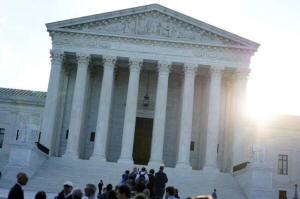|
Eclipsed by Kavanaugh fight, divided U.S.
top court opens new term
 Send a link to a friend
Send a link to a friend
 [October 02, 2018]
By Andrew Chung and Lawrence Hurley [October 02, 2018]
By Andrew Chung and Lawrence Hurley
WASHINGTON (Reuters) - The short-handed
U.S. Supreme Court launched its new term on Monday, with the legal
arguments in its stately courtroom overshadowed by the harsh fight over
President Donald Trump's nomination of Brett Kavanaugh for a lifetime
job as a justice.
On the surface, it looked like business as usual for the high court,
except that there were eight justices on the bench, not the usual nine,
following the retirement of long-serving conservative Justice Anthony
Kennedy, effective in July. Trump selected Kavanaugh to replace Kennedy,
but the Senate confirmation process has been detoured as the FBI
investigates sexual misconduct allegations against the nominee.
There was no mention of the ferocious confirmation battle as the
justices heard arguments in two cases, kicking off a term running
through June.
The difficulties facing the court now that it is - at least temporarily
- evenly divided ideologically with four liberals and four conservatives
were on full display in the first of the two cases. Kavanaugh's
confirmation would restore and deepen conservative control of the court.

A 4-4 split is possible in the case, a property rights dispute brought
by timber company Weyerhaeuser Co seeking to limit the U.S. government's
power to designate private land as protected habitat for endangered
species. The dispute focused on the dusky gopher frog, an amphibian
protected under the federal Endangered Species Act.
Weyerhaeuser harvests timber on the Louisiana land in question and is
backed in the case by business groups including the U.S. Chamber of
Commerce. Weyerhaeuser challenged a lower court ruling upholding a 2012
U.S. Fish and Wildlife Service decision to include private land where
the frog does not currently live as critical habitat, potentially
putting restrictions on future development opportunities.
The case pitted property rights against federal conservation measures.
The frog, found only in four locations in southern Mississippi, also
previously inhabited Louisiana and Alabama.
While the liberal justices appeared sympathetic to the government's
defense of the critical habitat designation, the conservatives seemed to
lean toward the property owners.
"We know that habitat isn't just where a species lives. ... It's also
where a species could live," liberal Justice Elena Kagan said.
Conservative Justice Samuel Alito said that although some people may not
"shed tears for a big corporation" like Weyerhaeuser being forced to
spend money to benefit frogs, the law would apply equally to a family
farm.
[to top of second column]
|

People wait in line to attend the opening day of the new term of the
Supreme Court in Washington, U.S., October 1, 2018. REUTERS/Aaron P.
Bernstein

A 4-4 ruling, as is possible in this case, leaves lower court
decisions in place and sets no nationwide legal precedent. If
Kavanaugh is confirmed, the court could decide to rehear the case
with a full complement of justices.
AGE DISCRIMINATION CASE
The second case involved the scope of a federal law that outlaws
discrimination on the basis of age.
Firefighters John Guido and Dennis Rankin, who were 46 and 54 years
old respectively at the time, were fired in 2009 from their jobs at
the Mount Lemmon Fire District, near Tucson, Arizona. They were the
district's oldest full-time employees.
Guido and Rankin sued, saying the fire district had violated the Age
Discrimination in Employment Act. The dispute centers on whether
that law applies to state and local government entities regardless
of size, or whether those with fewer than 20 employers like this one
are exempt, as private employers are.
Most of the justices on Monday seemed inclined to uphold a lower
court ruling in favor of the firefighters.
Chief Justice John Roberts began the day's proceedings by
congratulating Justice Ruth Bader Ginsburg, at age 85 the oldest of
the justices, for her "distinguished service" during a quarter
century on the court.
Before hearing their first arguments, the justices issued a list of
cases they were accepting and rejecting. Among them, they rejected
Bill Cosby's bid to avoid a defamation lawsuit brought by a
well-known former model, Janice Dickinson, who said the comedian
sought to destroy her reputation after she publicly accused him of
rape.

Trump nominated conservative federal appeals court judge Kavanaugh
in July. The FBI investigation, ordered by Trump on Friday under
pressure from moderates in his own party, is due to last no more
than a week.
Trump on Monday said he wanted the FBI investigation to be
comprehensive, but quick, and not a "witch hunt."
(Reporting by Andrew Chung; Additional reporting by Lawrence Hurley;
Editing by Will Dunham)
[© 2018 Thomson Reuters. All rights
reserved.]
Copyright 2018 Reuters. All rights reserved. This material may not be published,
broadcast, rewritten or redistributed.
Thompson Reuters is solely responsible for this content. |